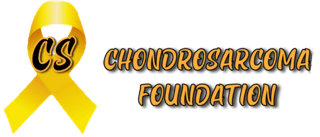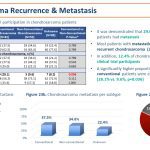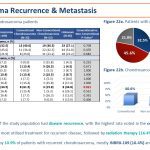Chondrosarcoma Patient Registry reveals one-third of CS Patients have a Recurrence / Metastasis. Efforts for Prevention are needed.
Chondrosarcoma Patient Registry reveals one-third of CS Patients have a Recurrence / Metastasis; Efforts for Prevention are needed.
The ChondrosarcomaFoundation was the first foundation to be inducted into the NORD IAMRARE Patient Registry 2.0 platform. Since our launch we have had over 230 CS Patients participate in the registry and we just completed our first full data analysis from the data collected from 169 participants who completed all of the surveys in the registry. This is the first global Natural History Study addressing Chondrosarcoma.
For the past few weeks we have been sharing major findings (one result at a time) to help both the sarcoma / oncology medical profession and the CS patient community understand and use these results towards building developing better practice / interventions as well as better research and clinical trials.The results we are sharing this week on recurrence and metastasis are significant and need to have a lot more attention.
Recurrence occurs when Chondrosarcoma resurfaces in the same area after surgery.The Chondrosarcoma Patient Registry found that almost a third (32.5%) of the chondrosarcoma population had disease recurrence and the highest rate occurred among those diagnosed were patients diagnosed with conventional chondrosarcoma. Sugery (34.5%) was the most utilized treatment for recurrence, followed by radiation therapy (16.4%) and chemotherapy (14.5%). Medications were used by only a small group of patients (10.9%) mostly INBRX-109 (16.4%) and pazopanib (Votrient) at (10.9%).
Metastasis: If tumors appear in another area of the body (typically the lungs) then chondrosarcoma has metastasized. Metastasis was noted in 29.0% of chondrosarcoma patients and most patients with metastatic chondrosarcoma also had recurrent chondrosarcoma (28.4% of the total sample). In addition, we discovered thatonly 12.4% of chondrosarcoma patients with metastasis were enrolled in a clinical trial.
Conclusions: In most cases if recurrence or metastasis happens then chondrosarcoma tends to be inoperable and other treatment interventions need to be implemented.There is very little we know about preventing and treating recurrence and metastasis. There are no FDA approved interventions or medications and currently only two clinical trials are available for treating advanced metastasis and recurrence for conventional chondrosarcoma (INBRX-109 and Ivosidenib). There are no effective treatments to treat the agressive non-conventional sub-types including dedifferentiated and mesenchymal chondrosarcoma.There are no existing studies (that we are aware of ) that focus on how to prevent recurrence or metastasis after diagnosis or surgery.
Prevention and treatment of recurrence and metastasis need a lot more attention from the sarcoma / oncology medical profession and the CS patient community. More science and clinical trials are needed to fully understand the nature of the disease progression. We also advocate for the development of prophylatics to block, supress and/or inhibit the progression of recurrence and metastasis before it is ever discovered. To achieve this, we all play a role and we all need to work together.
One potential effort would be to boost genomic sequencing. Last week, we reported that only a small groupof CS patients obtained a genomic sequencing test.Gene testing was performed in only 18.9% of chondrosarcoma patients. We believe all chondrosarcoma patients should get a gene test. Genomic sequencing is a promising tool for expanding the treatment options for chondrosarcoma patients. Genomic sequencing technologies are capable of characterizing known and novel clinically relevant biomarkers, like IDH1/2, and is becoming a useful tool for drug development, facilitating drug target discovery, clinical trial patient selection, and clinical correlate analyses to improve the quality and longevity of life for chondrosarcoma patients.This effort should also be a priority to prevent recurrence and metastasis.
Every cancer has a unique genome, and understanding the genetic characteristics of chondrosarcoma can help fight it at its origin. From a research perspective, the new frontier of genomic sequencing and personalized medicine shows promise for more effective treatments and, hopefully, will contribute to finding a cure.We want to encourage chondrosarcoma patients and family members to discuss the value of genetic testing with their treating oncologist / physician and in consultation determine if genomic testing is an option for them.
Your participation is essential. Be A Part of the Chondrosarcoma Patient Registry.
To Register: https://chondrosarcoma.iamrare.org/
It is not too late to sign up to participate in the Chondrosarcoma Patient Registry. The register is open at any time for CS Patients or Caregivers to go on-line and complete 9 surveys which will take less than an hour to complete. We need you to share your journey and help progress research in chondrosarcoma.
The Chondrosarcoma Patient Registry creates a platform for patients around the world to strengthen their voices and share information about this rare bone cancer. This global resource will provide data for researchers to use to advance drug development and treatment options and help improve patient care. The patient information that the registry collects will help give direction to scientists on areas in which to focus their research efforts, and to hopefully allow clinicians to see trends in patient responses to treatment for chondrosarcoma. The hope for the future is to illuminate treatments that have had some success that may become the standard of care for this rare bone cancer.


